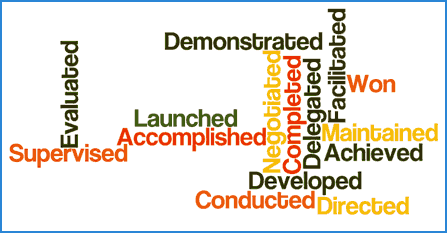 Sobhan Mohmand, Career Expert
Sobhan Mohmand, Career Expert  6 July 2023
6 July 2023

Finding the right words to express your skills, achievements and past experience is one of the hardest parts of writing a CV. You know what you want to say but you can’t quite find the right word to express it on paper.
Or you may find yourself using the same word over and over again.
Fortunately, here is where CV key words come to the rescue!
These key words, also known as buzzwords or action words, are a powerful collection of positive words, action verbs and phrases that you can use to describe your daily work, duties, responsibilities and achievements.
You can use key words to reinforce the message that you are a positive, upbeat and professional candidate – the kind that every employer wants.
A 2005 study by the psychology department of the University of Hertfordshire showed that using powerful words and phrases in CVs and application forms determined which candidates were shortlisted. The best words to add to a CV, according to the study, include ‘achievement’, ‘transferable skills’ and ‘developed.’ (Source: You’re hired, how to write a brilliant CV, Corinne Mills, Pg.91).
This guide lists 40 examples of the best positive words and phrases to use on your CV to add extra flavour to it and secure more job interviews.
Let’s get started!
The term “analysed” refers to examining something in detail, breaking it down into its components, and studying or interpreting its various elements or aspects.
Employees with analysing experience are highly valued by employers for their critical thinking, data-driven decision-making and attention to detail. These skills contribute to organisational success and enable employees to add value in various roles and industries.
The term “assessed” refers to the process of evaluating or estimating something to determine its quality, value or significance. It involves analysing data, gathering information and making evaluations to make an informed decision.
A candidate’s ability to assess is crucial in various roles and industries, such as project management, quality control, risk management and business.
The term “audited” refers to the examination and verification of financial records, processes, or systems to ensure accuracy, compliance and reliability.
Employers appreciate candidates who can conduct thorough audits, identify control weaknesses and recommend improvements. The ability to audit effectively is crucial in roles related to accounting, finance, business, engineering, compliance and risk management.
Budgeting is the process of planning and allocating financial resources. It involves estimating income, forecasting expenses and making decisions on how funds will be allocated and managed in a project or within an organisation.
Using budgeting as a key word on a CV demonstrates a candidate’s ability to effectively manage financial resources, make informed decisions and contribute to the financial stability and efficiency of the organisation.
The term “completed” refers to finishing or accomplishing a task, activity or project. It indicates that something has been successfully done or achieved in its entirety.
Communicating refers to the act of conveying information and ideas effectively to others through various mediums such as speaking, writing, listening and non-verbal cues.
Employers value strong communication skills on candidates’ CVs because it’s essential for collaboration, teamwork, customer interactions and conveying ideas clearly and persuasively.
Constructing refers to the process of building or creating something by assembling various components or materials. It involves planning, organising and implementing tasks to create a finished product or structure.
Including this skill on a CV demonstrates the candidate’s ability to execute projects, work with their hands and bring ideas into reality.
Coordinating refers to the act of organising and synchronising activities, tasks or people to achieve a common goal. It involves managing resources, timelines, teamwork and collaboration with other people.
Creating refers to the act of bringing something new into existence or generating original ideas, concepts, or products.
Delegating refers to the act of assigning tasks or responsibilities to others while retaining overall accountability and authority.
Delegating skills indicate effective leadership, trust in team members and the capacity to prioritise and allocate resources efficiently.
This action verb should be on the CV of all experienced professionals, managers and executives.
Delivering refers to the act of completing or providing something according to expectations.
Employers value this skill on candidates’ CVs because it signifies their ability to meet deadlines, achieve results and fulfil commitments.
Demonstrating refers to the act of showing or illustrating a skill, ability or concept to others. It involves effectively communicating and showcasing expertise, often through practical examples or presentations.
Designing refers to the process of creating or developing something according to a specific plan or intention.
Diagnosing refers to the process of identifying and analysing problems, issues or conditions through careful examination, investigation and evaluation.
Employers value the skill of diagnosing on candidates’ CVs because it demonstrates their analytical skills, problem-solving abilities and attention to detail.
Evaluating refers to the process of assessing, analysing, and making judgments about the value, effectiveness or quality of something.
Evaluation skills demonstrate a candidate’s ability to critically assess situations, make informed judgments and provide valuable insights – a great verb to use on your CV!
Examining refers to the act of closely observing, inspecting or scrutinising something in detail to gain a deeper understanding or uncovering specific information.
Exceeding refers to surpassing expectations, goals or standards by achieving or performing at a level that is higher or better than anticipated.
Using this key word on a CV indicates a candidate’s motivation, drive and capacity to go above and beyond to achieve success.
Identifying refers to the process of recognising, discovering or determining something.
Identifying skills indicate a candidate’s capacity to recognise opportunities, assess situations and contribute valuable insights to the organisation.
Implementing means putting a plan, idea, strategy or system into action.
Implementing skills on a CV indicate a candidate’s capacity for project management, problem-solving and completing tasks to a high standard.
Improving means making something better.
Employers value this skill on a CV because it signifies a candidate’s ability to identify areas for enhancement, implement changes and achieve positive results.
Increasing refers to the act of making something larger or greater in quantity, size or value.
Adding this key word to your CV demonstrates to the employer that you can add value to their organisation and achieve growth targets.
Initiating refers to the act of starting or launching a project, idea or process.
Employers value the skill of initiating on candidates’ CVs because it demonstrates their ability to take initiative, show leadership and drive innovation.
Introducing means bringing something new into a system, environment or setting.
Introducing skills indicates a candidate’s creativity, adaptability and willingness to explore new possibilities.
Leading refers to the act of guiding, directing or influencing others toward a common goal or objective.
Mentioning this skill on a CV indicates a candidate’s leadership capabilities, interpersonal skills and ability to motivate and inspire others. This key word should be included on the CVs of all managers, leaders and senior professionals.
Learning refers to the process of acquiring knowledge or skills through study, experience, or training.
Employers value the skill of learning on candidates’ CVs because it demonstrates their ability to continuously develop, grow and stay relevant in a rapidly changing work environment.
Managing means overseeing, directing and controlling resources, activities or people.
If you have experience managing a team or project, you should definitely include this key word on your CV as it’s an essential requirement for leadership and managerial roles.
Marketing refers to the activities and strategies undertaken to promote, advertise and sell products or services.
Marketing skills on a CV indicate a candidate’s creativity, strategic thinking and ability to effectively communicate and persuade.
Motivating refers to the act of inspiring or encouraging others.
You should use this key word on your CV if you’re applying for jobs in which leadership and team management skills are required.
Negotiating refers to the process of discussing and reaching a mutually beneficial agreement between parties involved in a conflict or business transaction.
Employers like to see negotiation skills on candidates’ CVs because it demonstrates their ability to advocate for their interests, collaborate with others and achieve win-win solutions.
Planning refers to the process of setting goals, determining actions and organising resources to achieve desired outcomes.
Planning is a great key word to add to your CV if you’re applying for a job in project management, event planning, operations, marketing, finance or logistics.
Presenting refers to the act of delivering information, ideas or proposals to an audience.
Presentation skills on a CV indicate a candidate’s confidence, professionalism and capacity to engage and inspire an audience.
Example:
Recruiting refers to the process of sourcing, identifying and attracting qualified individuals to fill job vacancies.
Recruiting skills on a CV indicate a candidate’s understanding of the hiring process, their ability to evaluate candidates effectively and their capacity to contribute to building a strong and capable workforce.
This key word should be prominently featured in human resources-related CVs.
Representing refers to the act of acting as a spokesperson, advocate or ambassador on behalf of an individual, organisation or cause.
Having experience in representing someone demonstrates the candidate’s ability to communicate persuasively, build relationships and represent the organisation’s best interests.
Raising refers to the act of collecting or generating funds, resources, or support for a particular cause, project, or initiative.
This is a great key word to add to your CV as it demonstrates your ability to generate financial resources and secure investments, especially if you’re applying for a job in the public sector or a charity organisation.
Reducing refers to the act of decreasing or minimising something, such as costs, expenses, waste or inefficiencies.
Employers like to see this key word on candidates’ CVs because it demonstrates their ability to optimise resources, improve operational efficiency and contribute to cost savings or process improvements.
Solving refers to the act of finding solutions to problems or challenges.
Problem-solving skills indicate a candidate’s critical thinking abilities, adaptability and capacity to overcome obstacles.
Supervising refers to the act of overseeing, managing and directing the work of others to ensure tasks are performed effectively and according to established guidelines.
Adding this key word to your CV will demonstrate your ability to lead teams, drive performance and ensure the successful completion of projects or tasks.
In short, supporting refers to providing assistance, guidance or resources to individuals, teams or projects to help them achieve their goals or objectives.
Supporting others demonstrates your ability to collaborate, contribute to a positive work environment and provide valuable assistance to your colleagues or teams.
Teaching refers to the act of imparting knowledge, skills or information to others through instruction, guidance and mentorship.
Teaching skills are valued in various industries where education, training and professional development play a significant role in achieving organisational success.
Writing refers to the act of expressing ideas, information or thoughts through written language.
Industries such as marketing, communications, journalism, content creation, public relations, and publishing particularly value individuals who can write clear, engaging and impactful content.

Not all action verbs or phrases are created equal.
Below is a list of the best words you could use in your personal profile or when describing your achievements and previous work experience:

In addition to action verbs, you should also make use of powerful words and phrases that describe your personal qualities and attributes to the employer. You could use them to write your personal profile statement.
Best personal attributes key words for a CV include:
Research has shown that an effective way of making your CV stand out and have a greater impact is to use action-oriented CV key words such as “managed”, “developed”, “designed”, “completed” and “achieved.”
CVs that incorporate these powerful action verbs are usually punchier, crisper and easier to read. They also have a greater chance of passing through the Applicant Tracking Systems (ATS) screening process, designed to automatically review and filter incoming CVs.
To maximise the benefits of using key words, carefully review the job description, identify relevant key words that match your experiences, achievements or skills and incorporate them naturally throughout your CV.
Good luck with your job search!